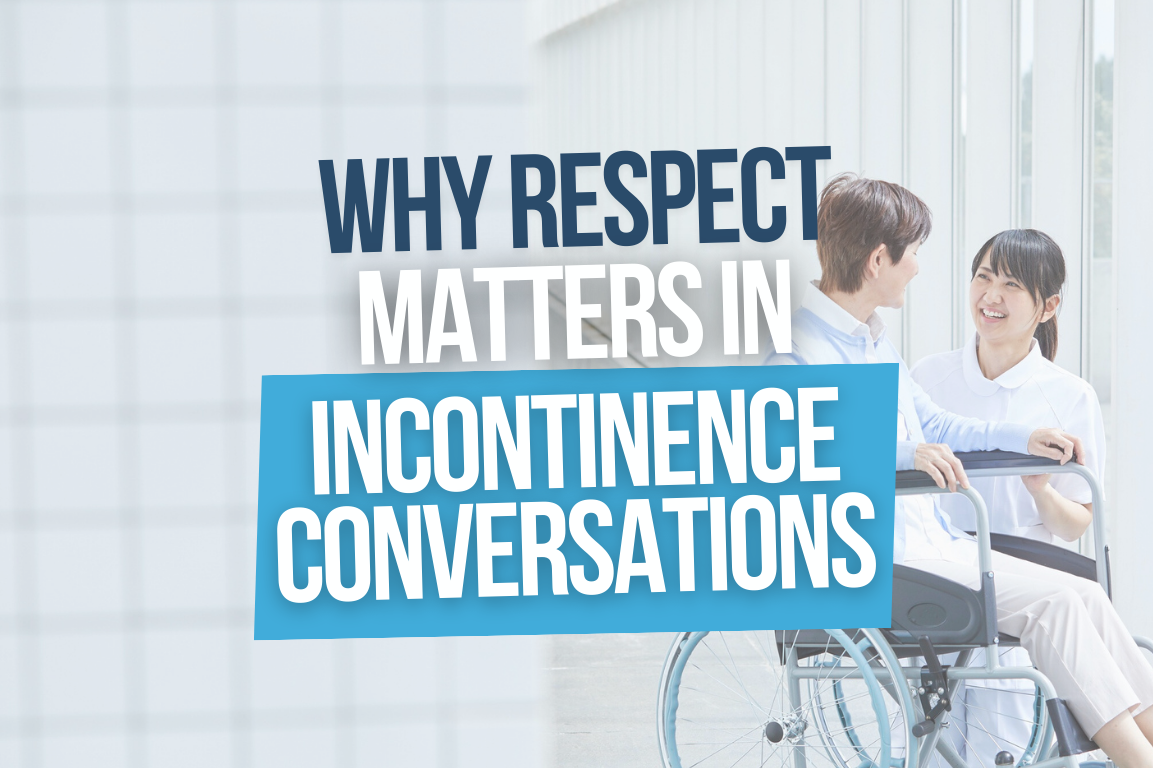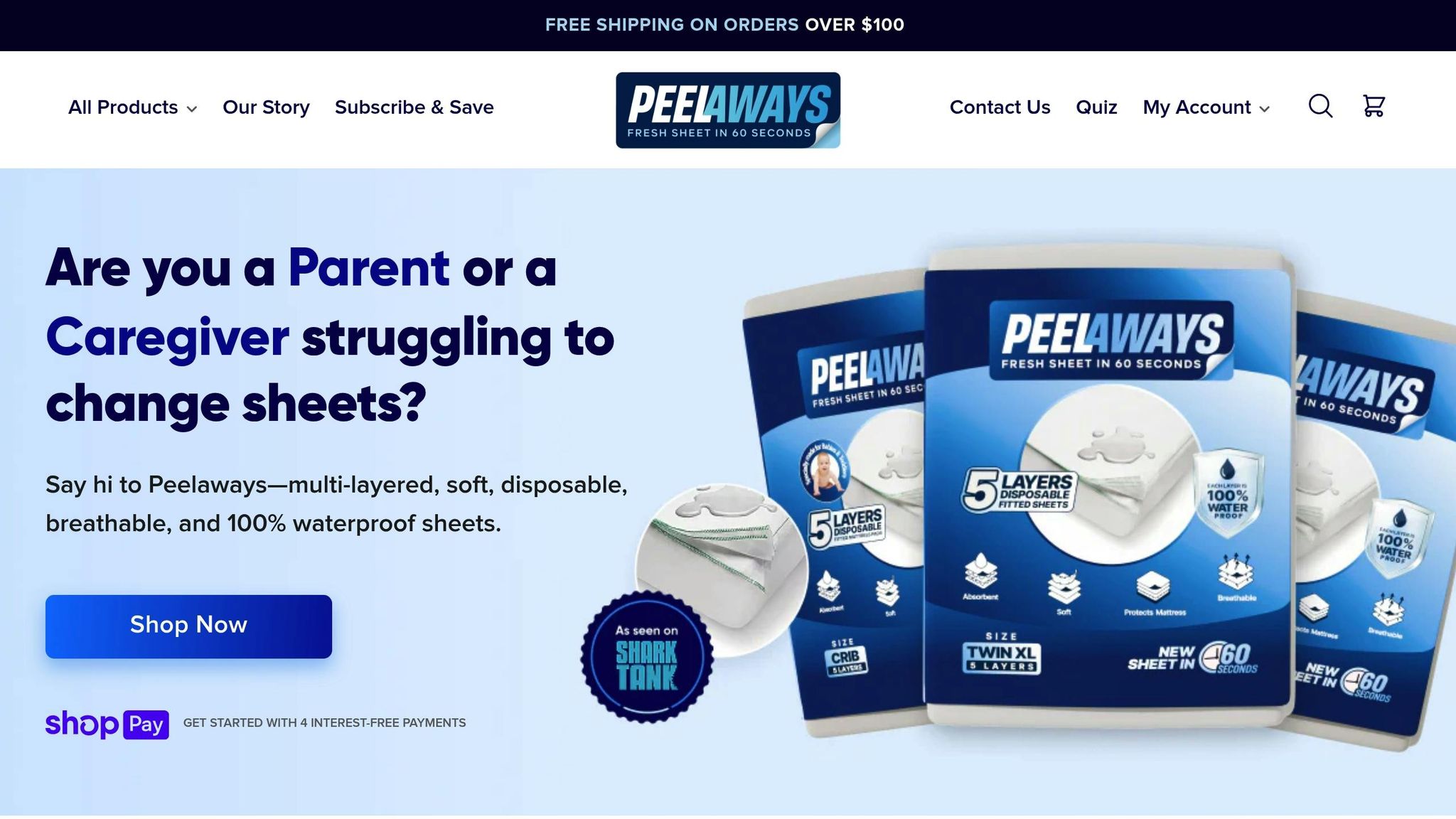Why Respect Matters in Incontinence Conversations

Talking about incontinence is tough, but respect makes all the difference. When handled poorly, these conversations can lead to embarrassment, strained relationships, and even mental health struggles like anxiety or depression. Respectful communication helps build trust, preserve dignity, and encourage openness, making it easier for individuals to seek help and manage their condition effectively.
Key takeaways:
- Privacy and timing: Choose a quiet, distraction-free moment to talk.
- Language matters: Avoid demeaning terms, and use clear, non-clinical phrases.
- Empathy and listening: Validate feelings and let individuals guide the conversation.
- Support independence: Involve people in care decisions to maintain control over their lives.
- Practical tools: Products like PeelAways disposable bed sheets simplify care while reducing embarrassment.
Respect isn’t just kind - it improves care outcomes and emotional well-being. Let’s dive into how to approach these conversations with empathy and thoughtfulness.
Talking About Incontinence: Why It Matters More Than Ever
The Emotional Side of Incontinence
Living with incontinence often brings a heavy emotional toll. For many, the mental and emotional strain outweighs the physical challenges, creating barriers to seeking help or accepting care. Acknowledging these emotional struggles is key to fostering compassionate and respectful conversations about incontinence.
Why People Avoid Talking About Incontinence
The social stigma surrounding incontinence is one of the biggest obstacles to open discussion. In American culture, privacy around bodily functions is deeply ingrained, and losing control over these functions is often associated with shame. Many view incontinence as a personal failure rather than a medical condition that can affect anyone, regardless of age.
Another challenge is the misconception that incontinence only affects the elderly. Younger adults and middle-aged individuals who experience incontinence often feel isolated and out of place. They may believe they’re too young to face such issues, which can lead to feelings of abnormality or self-doubt.
Cultural and gender expectations also play a role in how people approach the topic. Men, for example, may find it particularly difficult to discuss incontinence, as it clashes with traditional ideas of masculinity centered on strength and control. Women, while more likely to seek help, often delay doing so due to embarrassment or the belief that incontinence is something they should endure as a natural consequence of aging or childbirth.
These avoidance behaviors highlight the emotional weight of incontinence and pave the way for understanding its impact on mental health.
How Incontinence Affects Mental Health
The emotional challenges tied to incontinence can lead to serious mental health issues, including chronic anxiety, depression, and a sense of lost independence.
Chronic anxiety becomes a constant companion for many, driven by the fear of accidents in public or social settings. This fear can lead to drastic lifestyle changes, including social withdrawal, as individuals try to avoid potentially embarrassing situations.
Depression often follows, fueled by feelings of hopelessness. Physical discomfort, combined with isolation and a loss of control, creates a perfect storm for depressive symptoms. Over time, many people see their self-worth diminish, which deeply affects their sense of identity and purpose.
The loss of independence can be particularly devastating. Adults who have long been self-reliant may suddenly find themselves needing help with basic hygiene and daily care. This loss can trigger frustration and helplessness that ripple through every aspect of life.
The fear of being discovered adds another layer of stress. Many people go to great lengths to conceal their condition, developing routines that include carrying extra supplies, avoiding certain clothing, or meticulously planning outings around bathroom access. This constant vigilance is mentally draining, robbing individuals of the ability to fully engage in life.
Relationship strain is another emotional challenge. Intimate relationships may suffer as individuals withdraw both physically and emotionally. Family dynamics can also become tense when incontinence needs aren’t addressed openly. The person experiencing incontinence may feel like a burden, while family members may feel unprepared or overwhelmed by caregiving responsibilities.
Over time, self-esteem erodes as each accident or vulnerable moment chips away at confidence. Many begin to define themselves by their condition rather than their strengths, relationships, or achievements. This negative self-image can create a vicious cycle, making it even harder to seek help or participate in social activities.
Anticipatory anxiety - the constant worry about potential accidents - can be just as overwhelming as the condition itself. People may spend hours obsessing over what might happen, double-checking their precautions, or avoiding situations altogether. This heightened state of alertness is exhausting and makes it difficult to enjoy life’s moments.
Recognizing these emotional struggles underscores the importance of approaching incontinence conversations with care and empathy. When caregivers, family, and healthcare providers take the time to understand the full scope of someone’s experience, they can provide support that not only addresses practical needs but also nurtures emotional well-being.
Basic Rules for Respectful Communication
Respectful communication is essential when addressing sensitive topics like incontinence care. The way you initiate, navigate, and conclude these conversations can either build trust or create barriers. Recognizing that patients seek relationships rooted in empathy, understanding, and trust [2] should guide every interaction, ensuring meaningful and supportive exchanges.
Setting Up Private Conversations
Creating a comfortable environment for sensitive discussions starts with timing and setting. Choose a relaxed, private moment free from distractions to help the individual feel at ease.
Physical privacy is equally important. Opt for a quiet, interruption-free space, and sit at the same level as the person you’re speaking with to foster a sense of mutual respect.
Emotional readiness matters just as much. Pay attention to cues that indicate whether the individual feels prepared to talk. If they seem anxious or overwhelmed, it may be better to postpone the conversation. Establishing regular check-ins can also normalize these discussions, making incontinence just one of the many health topics you address over time.
Once privacy is ensured, the next priority is choosing respectful and thoughtful language.
Choosing the Right Words
The words you use can significantly influence how comfortable someone feels talking about their condition.
- Use clear, non-clinical terms: Phrases like "bladder leaks" or "loss of bladder control" are more approachable than medical jargon [3].
- Avoid infantilizing language: Refrain from terms like "accidents" or "wet pants", which can feel demeaning. Instead, use straightforward phrases such as "bladder control challenges" or "managing leakage."
- Practice empathetic phrasing: Open-ended questions like "Are you experiencing any problems with going to the toilet?" allow the individual to share their experiences without feeling pressured [1].
- Focus on solutions: Keep the conversation positive and forward-looking with phrases like "Let’s explore some options that might help" or "There are several approaches we can try." This keeps the discussion constructive and emphasizes that effective management strategies are available [1][3].
After choosing the right words, the next step is to actively listen and respect the individual’s preferences.
Listening and Respecting Personal Preferences
Mindful communication doesn’t stop at speaking - it also requires attentive listening and honoring the individual’s needs.
- Active listening: Pay close attention to both the words and emotions expressed. Mirror the language they use to describe their condition to demonstrate understanding and respect [3].
- Validate their feelings: Acknowledge the emotional difficulty of the situation with comments like "I can see why this would be frustrating" or "It’s understandable that you’d feel concerned about this." Empathy is a key expectation in these conversations [2].
- Empower through choice: Ask questions like "What would make you most comfortable?" to let them guide the conversation. This approach ensures the discussion is centered on their preferences and needs [1].
- Avoid blame: Steer clear of comments that may unintentionally assign fault, such as "Why didn’t you tell me sooner?" or "You should have been more careful." Instead, focus on understanding and moving forward together [3].
Ways to Preserve Dignity and Independence
Preserving dignity and independence, especially for those managing incontinence, starts with empowering choices and minimizing embarrassment. Research highlights that dignity-focused continence care revolves around three key elements: autonomy, respect, and communication [4]. This means individuals should play an active role in their care planning, ensuring their needs and preferences are front and center.
Including People in Their Own Care Decisions
Respectful care thrives on collaboration. It’s about listening to individuals and incorporating their preferences into care decisions. Patient-centered care embraces this principle by fostering open communication between patients, their families, and healthcare providers [5]. This cooperative approach shifts the dynamic from dependency to teamwork [4].
Involving individuals in decisions - whether it’s choosing a caregiver of a specific gender, setting toileting schedules, or selecting preferred products - supports their sense of control [4][7][9]. Encouraging self-determination, like allowing people to communicate their needs or establish their own routines, further reinforces their independence [7].
Even the way we communicate matters. Using collaborative language - like asking, “Do you mind if…” instead of saying, “I must…” - and avoiding childlike terms such as “potty” respects the individual’s adult status and decision-making capabilities [4][6][7][9]. These small shifts in language can make a big difference in preserving dignity.
Beyond decision-making, addressing embarrassment in daily care is another vital step.
Making Care Less Embarrassing
Creating a respectful care environment means addressing both emotional and practical concerns. When individuals feel respected and included in their care, they’re more likely to accept assistance without embarrassment [6]. Simple gestures, like maintaining a calm tone and making appropriate eye contact, foster trust and respect [4][7].
Innovative tools can also help reduce discomfort. For example, PeelAways’ multi-layer disposable sheets make care more seamless by eliminating the need to lift mattresses. These sheets, available in options with 5 to 7 layers depending on size, allow caregivers to quickly remove a soiled layer, revealing a clean one underneath. This minimizes disruptions and helps maintain privacy during care.
Professional training for caregivers plays a crucial role in these efforts. Caregivers are taught to recognize when to step in and when to let individuals handle tasks independently, promoting autonomy [8]. Additionally, accompanying individuals to medical appointments and keeping symptom records can boost their confidence and preparedness when discussing their condition with healthcare providers. This ensures they remain the central voice in their healthcare decisions, with respect and dignity forming the foundation of effective care.
sbb-itb-45288fe
Tools That Support Respectful Incontinence Care
Having the right tools can turn incontinence care from a potentially stressful and awkward situation into a process that prioritizes dignity and ease for everyone involved. PeelAways is a great example of how a well-designed product can simplify care while maintaining respect for the individual.
How PeelAways Make Hygiene Easier and More Private

Changing traditional bed sheets during incontinence episodes often involves multiple caregivers, heavy lifting, and extended exposure - factors that can increase discomfort for the person being cared for. PeelAways disposable bed sheets tackle these challenges with their multi-layer design, making care quicker and more dignified.
The peel-away system lets caregivers remove a soiled layer in seconds, instantly revealing a clean sheet underneath. This reduces the time the individual is exposed during care, while the waterproof barrier ensures the mattress stays protected. Meanwhile, the soft, breathable fabric keeps the person comfortable throughout use.
What sets PeelAways apart is how it supports privacy and independence. Many individuals can remove the top layer on their own, reducing their need for assistance. The sheets are pre-fitted to the mattress, so there's no struggle with loose bedding. This design is especially helpful for families managing incontinence at home, as it minimizes laundry needs and prevents cross-contamination between layers. Used layers can simply be disposed of, keeping the process discreet and hassle-free.
Benefits of Multi-Layer Disposable Products
The multi-layer design of PeelAways offers practical and hygienic benefits that go beyond single-layer solutions. Traditional bed changes often require significant time and effort, sometimes involving multiple caregivers. In contrast, PeelAways allow for a quick, one-person change. Each new layer provides a fresh, clean surface, eliminating concerns about lingering odors or stains. The waterproof barrier protects not only the mattress but also surrounding furniture.
Comfort is consistent across all layers, thanks to the soft, breathable fabric that ensures a pleasant sleep experience. PeelAways come in various sizes to fit different beds, from Crib-A-Peel sheets for toddlers at $30.99 to King size sheets at $53.99, making them versatile for a range of needs.
For those planning long-term care, PeelAways offer additional perks like a 15% subscription discount and free shipping on orders over $100, making them a cost-effective choice.
Perhaps most importantly, these products ease the emotional strain on both caregivers and individuals. When accidents happen, they can be handled quickly and discreetly, helping maintain daily routines with minimal disruption. By simplifying the process, PeelAways help preserve a sense of dignity and normalcy for everyone involved.
Conclusion: Why Respect Matters in Incontinence Care
Respect is at the heart of providing thoughtful and dignified incontinence care. It ensures that even in the most sensitive moments, a person's dignity remains intact. Approaching these situations with empathy and carefully chosen words fosters an environment where individuals feel safe and unashamed discussing their needs.
The strategies we've explored - like having private conversations, using person-centered language, and involving individuals in their care decisions - are essential. These practices build trust, promote independence, and ease emotional strain. Tools like PeelAways also play a role by reducing exposure and caregiver involvement. When someone can independently manage a layer change or take steps toward self-reliance, it reinforces their sense of autonomy and control.
FAQs
How can I talk to a loved one about incontinence while ensuring they feel respected and supported?
Starting a conversation about incontinence might feel awkward, but a little empathy and understanding can go a long way. Start by talking about their general health and gently bring up the topic in a way that feels supportive, not judgmental. Let them know you care and are there to help, which can make the discussion less uncomfortable.
Ask open-ended questions to keep the conversation flowing, and really listen to what they have to say. Stay calm, patient, and reassuring to create a sense of trust. It's also important to respect their dignity - focus on practical solutions that make life easier, like disposable, multi-layered bed sheets. These can simplify care and take some of the stress out of the situation for everyone.
How can we reduce the stigma around incontinence and encourage open conversations?
Reducing the Stigma Around Incontinence
Addressing the stigma surrounding incontinence begins with encouraging open and compassionate conversations. When we discuss the condition in a supportive and understanding way, it helps to normalize the experience and reduce feelings of embarrassment or shame that many individuals might carry.
Another important step is education. Spreading awareness about incontinence - its causes, effects, and available solutions - can clear up misconceptions and empower people to seek the help they need. Creating welcoming spaces, whether online or in person, where individuals feel safe sharing their stories can also spark meaningful dialogue and foster a sense of connection and support.
On a practical level, products like Peelaways offer a simpler, more dignified way to manage incontinence. These multi-layer, disposable bed sheets allow caregivers and individuals to handle accidents efficiently and with minimal discomfort. By making cleanup quick and straightforward, they help maintain cleanliness and restore confidence in daily routines.
How can PeelAways help individuals with incontinence maintain dignity and independence?
PeelAways offer a smart and considerate solution for those dealing with incontinence by providing disposable, waterproof bed sheets with a clever multi-layer design. Instead of struggling with endless laundry or the hassle of moving heavy mattresses, users can simply peel off the soiled layer to reveal a fresh, clean one underneath.
This thoughtful design helps ease feelings of embarrassment, reduces physical effort, and lessens the need for caregiver assistance. By streamlining bed care, PeelAways promote a more dignified and hygienic experience for both individuals and their caregivers.
Related posts
- 7 Essential Tips for Nighttime Incontinence Care
- Quick Guide: Managing Overnight Accidents in Children
- 7 Tips for Preventing Skin Irritation from Incontinence
- How to Choose Bedding for Incontinence Care
Comments
0

SAVE MONEY & WATER
Professionals & Institutions save a fortune on labor/laundry.

SUPERIOR COMFORT
The first thing our customers notice is how soft our sheets are.

100% WATERPROOF
Each layer is 100% Waterproof, perfect for spills and accidents

SAVE TIME
Change the sheet in under 1 minute without stripping the bed.




Leave a comment